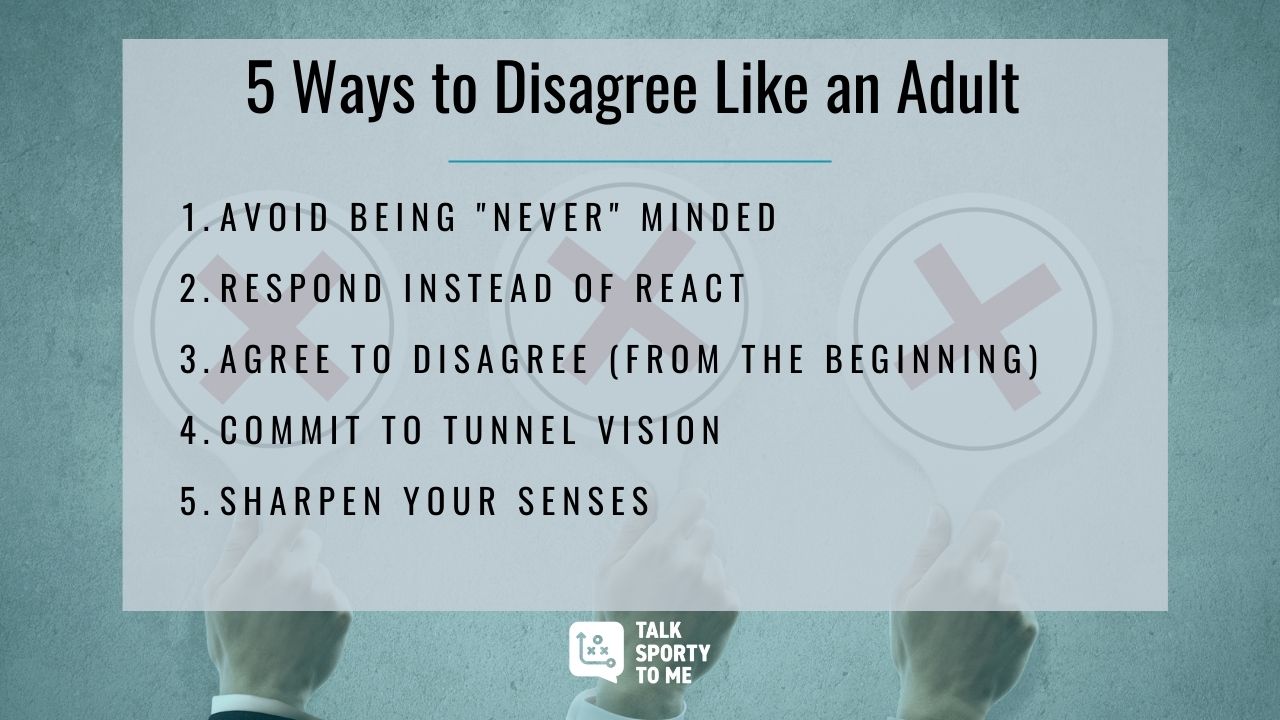5 Ways to Disagree Like An Adult
I originally posted this blog three years ago when it felt like “hot takes” were all the rage on TV. No one wanted to listen, and everyone wanted to yell.
Things haven’t changed all that much, but they should because listening is a leadership skill, as is controlling your emotions, showing empathy and knowing how to disagree like an adult.
I understand there’s a lot going on in the world. The stress and uncertainty can be overwhelming. Emotions are running high.
Great leaders don’t allow their emotions to make an already emotional situation more difficult.
Conflict happens in conversations. Disagreements happen and differing opinions exist. So does a better way of handling those situations.
I talk for a living. I actually talk sports for a living. But more importantly I talk to human beings for a living. After nearly two decades in sports, I’m well-practiced at asking questions, assessing the environment and engaging in conversations. I don’t always agree with what people say, decisions that are made or the way opinions get expressed, but it’s still my job to provide information and present different points of view with a level of tact. And these are the strategies I use to keep my cool in potentially heated conversations.

- Avoid Being “Never” Minded. Here’s another way to say it, avoid judging people’s actions or comments based on what you would never do. For example, a statement like; “I would never schedule a doctor’s appointment in the middle of the day,” seems innocuous because it’s a true statement about you. If you’re not careful however, it can lead to you making judgements against someone who does what you would never do. Avoid using any variation of the phrase, “I would never do that.” It’s one of the most practical ways to demonstrate having an open mind.
- Respond Instead of React. This isn’t a gameshow. The first person to react doesn’t score a point or win a prize. You can, however, win respect by formulating an appropriate response. Show discernment with your words. Your response can still be one of disagreement but demonstrate discipline to avoid adding fuel to a potentially explosive interaction.
- Agree to disagree – from the beginning. That phrase is often used to bring a disagreement to a somewhat peaceful conclusion. It shouldn’t be the end of the conversation it should be the beginning. When you agree to differing viewpoints from the outset you change the purpose of the entire interaction. It becomes a fact-finding mission. You’re not fighting to win a debate. As a result, you’re less concerned with keeping score and interested in what the other person is actually saying. You’re less likely to get distracted trying to remember your counterpoints. In addition, both parties are more likely to listen with empathy and understanding when it’s determined up front neither person is keeping score.
- Commit to tunnel vision. I know you are smart enough to link a single debate or topic to a myriad of other discussion points, but as an adult I also know you also have the ability to keep the main thing the main thing. Show restraint. Stay on topic. Agree on the real issue being discussed and resist the urge to add additional layers to the conversation.
- Sharpen Your Senses. Watching life through a screen (Zoom meetings, television, smart phone, tablet) stimulates your emotions, but dulls your senses. This leads to a lack of empathy and understanding. Step away from the screen when you can to regain your senses. There’s a human being on the other side of those calls and meetings. Get in touch with what you’re feeling and use your senses (sight, smell, touch, taste, feel) to assess the situation. It can help you navigate, and maybe even diffuse a tense conversation by seeing how the other person is affected.
Put this into practice...
I engage in back and forth conversations daily about trivial matters like, “How do you define an MVP season?” “What stats matter most?” or “Who’s the best quarterback of all time?”
They’re typical sports conversations, ones that help you practice face-to-face interactions in low-leverage situations. Sure, those debates can turn heated with overly-passionate fans, but in general sports scores and highlight-driven discussions (i.e. biggest plays of the game, best player performances, etc., discussions related directly to game-action, not social causes.) are a good way to practice, not just your conversation skills, but your ability to disagree like an adult.
Disagreements are going to happen. Make sure you have the skills to handle those situations graciously and position yourself in the best possible way. I bet you’d hate to find out you weren’t even considered for a project or promotion because of your ineffectiveness in dealing with disagreements.
The weekly Sports Conversation Starters posted every Monday can help you practice because disagreeing like an adult is a skill not just a response or reaction.


